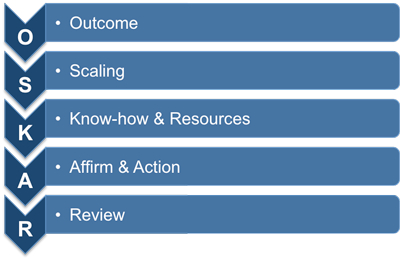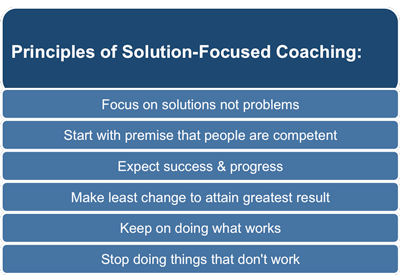The OSKAR Model
The OSKAR model was developed by Paul Z Jackson and Mark McKergow who describe the model in their book 'The Solutions Focus, Making Coaching and Change SIMPLE’, available from www.thesolutionsfocus.co.uk. This is a solution-focused model that requires you to ask questions in such a way as to move the coachee's attention away from problems in favor of solutions. Instead of discussing difficulties and their causes, the coaching session explores:
1) Desired goals
2) Exceptions that have led to success in the past (times when the problem did not occur)
3) Solutions (the changes that will have occurred once the goal is reached) as well as existing resources.
At heart this solution-focused approach involves finding out what works and doing more of it. It also entails stopping doing what doesn't work and doing something else.
 |
It is easy when coaching to focus on the problem and to explore it in great depth in order eventually to reach a solution. In particular, people are often keen to find 'the cause' of the problem and identify all the effects. Time spent doing this, however, is time that is not spent on finding a solution. This OSKAR Coaching Model Template helps you to monitor the progress of coaching based on the OSKAR model by recording desired goals, exceptions and solutions.
Outcome
This is similar but different to the 'goal' in most coaching models. The outcome is not simply the goal of the coachee. It is the difference that the coachee (and those around them) wants to see as a result of the coaching.
This establishes a 'platform' from which to coach. It clarifies:
• What the coachee wants to achieve (long, medium, and short term)
• What they want to achieve from the session itself
• How they will know it has been useful to them
• The perfect scenario desired by the coachee
You ask the coachee to suppose that suddenly and miraculously overnight the goal was achieved and the problems vanished. The typical questions you might ask at this stage are:
'I want you to imagine that you have attained your goal. What changes do you see in your working environment?
'You've come into work today to find that this problem has vanished. What changes have occurred?'
'What do you want to achieve?'
'Are there times when the solution is already present, or something similar? Can you identify what is different about these times?'
This leads to a discussion not merely about results, but also about the small and visible signs that the results are starting to happen, something that helps the coachee visualize their desired outcome.
Scaling
By asking the coachee where they rate things on a scale of 0-10 (where the Outcome is ten, and zero is the complete opposite), you will both find to what extent the current situation is working. By using this scale in your coaching you are likely see two things happen:
• The current situation is rarely zero
• Often there is already some limited progress towards the outcome even at the very beginning of the process.
The typical questions you would ask at this stage are:
'On a scale of 0 to 10, with 0 representing the worst it has ever been and 10 the preferred future, where would you put the situation today?'
'If 0 is no achievement and 10 is complete goal achievement, where are you on the scale already?'
'You are at "N" now; what did you do to get this far?'
'How would you know you had got to N+1?'
Know-How and Resources
You have identified how far along the scale the goal is. Now you have to help the coachee establish what factors are already contributing to getting the situation incrementally closer to the outcome.
The sort of questions you would ask at this stage are:
'What are your strengths?'
'What helps you perform at "N" on the scale, rather than 0?'
'What knowledge do you currently have that is helping you?'
'What resources do you have?'
'What skills do you currently have that are helping you?'
'What attitudes do you currently have that are helping you?'
'When does the outcome already happen for you - even a little bit?'
'What did you do to make that happen? How did you do that?'
This stage really is about finding out what is working - that is, what is already happening to get the situation closer to the objective. The search for know-how may be extended to include the coach, other people, and teams. The focus is always relentlessly on what works or what has worked rather than what won't work or what is wrong.
Affirm and Action
The 'A' in OSKAR stands for two steps:
• Affirm
• Action.
Affirm involves providing positive reinforcement to the coachee by reflecting back positive comments about the key strengths they have revealed in terms of their knowledge, skills, and attitudes.
For example:
'So your knowledge of "X" is extensive and has enabled …'
'Reacting to the situation in the way you describe was excellent because …'
'The level of skills within your team is much higher than others I've seen in this situation.'
'How can you use these resources and strengths to help you achieve your goal?'
Recognizing these qualities helps to build the coachee's self-belief, as well as enhancing the relationship between you and the coachee.
Action involves helping your coachee determine what actions they will take to keep moving toward the outcome. This means doing more of the things that have already been recognized as working rather than anything new or different.
For example:
'Will keeping that successful process in place help you complete that action?'
'What did you do to get this far?'
'How can you do more of that?'
'Do you think altering the current procedure has any additional benefits?'
Review
This final stage of the OSKAR coaching model involves reviewing progress and takes place at the beginning of the next coaching session. You should ask 'What is better?' rather than whether a particular action was carried out, or what happened. This keeps the focus on the things that are moving the process in the right direction.
You can go back to the scale to find out how much things have improved and what has helped the most, provided the emphasis remains on reviewing the positives. Typical questions for the review would be:
'What is better?'
'What did you do that made change successful?'
'What do you think will change next?'
This model's focus on finding a solution highlights key differences from a problem-based approach. Firstly, it clarifies what goal you want to attain by asking what you want to change rather than asking you to describe and assess a problem. It also asks what recent improvements the coachee has seen instead of recent difficulties.
 |
From a motivational perspective the solution-based model is more positive because it sees people as having problems rather than them being the problem! This is also reflected in you asking the coachee to explain what progress has been made and not asking for an explanation of the problems.
Finally, as the coach you get the individual to focus on the strengths and resources of the central issue, not the opposite aspects. The main principles of solution-focused coaching can be summarized as follows:
• It has a focus on solutions, not on analyzing problems
• It begins with the notion that people are competent
• It has an expectation of success and progress
• It believes that making the least change leads to the greatest results
• If something is working, keep on doing it
• If something is not working, stop doing it
The OSKAR coaching model is a framework to help your coaching sessions focus on solutions rather than problems. It doesn't mean that you refuse to discuss the problem, but it does mean that the focus is on finding a solution.
There are other coaching models available, but you should ensure that the one you decide to use has a sound foundation in coaching principles and is not a marketing tool for an organization's services or products. This sometimes occurs when a coaching organization wants to differentiate itself from a rival or to create a proprietary method that can then be sold or licensed.
You may also be interested in:
Management Coaching Skills and Models | Coaching and Active Listening | Asking Questions in a Coaching Session | Coaching and Goal-setting | Giving Feedback to the Coachee | Building Rapport with the Coachee | Demonstrating Empathy and Using Intuition in Coaching | Coaching Models and 'The Inner Game' | The GROW Coaching Model | The TGROW Coaching Model | Organizational Barriers to Coaching.



